Portland mayoral candidate and seeming frontrunner Ted Wheeler could imagine using decongestion charging to unclog Portland roads but isn’t ready to back a dedicated bus lane on Powell or Division.
He’s also a fan of dedicated bike signal phases and supports “rationing” auto parking as long as it’s done in conjunction with improved transit and biking options, but isn’t willing to specify how that rationing might take place.
Those were the takeaways from a blog post Wheeler put up Monday in response to questions that BikePortland and the advocacy group Oregon Walks relayed to him on Twitter after he was among the candidates to miss a mayoral candidates’ forum about transportation issues last week.
Here’s the full text of Wheeler’s responses. Some of the questions seem to have been paraphrased a bit, but not so much that their meaning was changed.
First question to candidates: “how would you allocate resources to meet our #visionzero goals?”
One death on our streets is too many. Already, 2016 traffic fatalities in the city of Portland total 11. This time last year we were at 6. It’s not about reinventing the wheel. I would continue the good work already being done by the Vision Zero Task force, especially around making equitable decisions and following the data.
The data is telling us we’ve got to focus our efforts in East Portland, and along these high crash corridors, like Foster, Sandy, Marine Dr, 82nd, and 122nd. A person living east of 82nd Ave is two and a half times more likely to die in a motor vehicle crash than someone who lives west of 82nd.
In high pedestrian traffic areas, we need more crosswalks. At intersections, where data shows cyclists are more likely to be involved in a crash, we need to look at separated bike lanes and right turn signals.
With a gas tax measure on the ballot, there’s a possibility that we’ll be seeing new revenue for street repair and traffic safety. As we maintain and repair our roads, we should be smart, data-driven, and strategic about how we prioritize safety measures like crosswalks, turn signals, and separated lanes.
Second question: “what are your ideas for improving parking policy in regards to how we manage our transportation system?”
There is no doubt that unlimited free parking encourages people to commute using their cars. Conversely, making parking more scarce or more expensive will discourage car trips. We must recognize that parking is the only way some can access education and employment, and has benefits for tourism and the local economy. Parking is just one factor in our transit strategy and it must be balanced with others. Rationing parking should be offset by greater investments in public transit and safe bicycle infrastructure. I would utilize data and modeling to help determine the right mix of parking by type, location, and price given both our overall transportation goals and the needs of our citizens.
Advertisement
Third question: do you support increasing the financial burden of driving on roadways to better incentivize alternate modes of transportation?
When it can be done in a way that’s equitable, absolutely. More and more people are chasing affordability to the East, but the jobs are still in the Western part of the region. That creates a couple challenges for people who are already struggling financially. The first is that they have longer commutes to work. The second is that there are fewer public transit options.
Am I in favor of incentivizing people to get out of their cars? Yes. Do I think a single mother with two children should be penalized for driving her kids to get groceries in an area that’s poorly served by transit? No.
That means we are going to have to do a lot better when it comes to creating accessible, affordable public transit options East of 82nd. I will continue to be a vocal champion for these investments.
Fourth question: would you remove a general vehicle travel lane on Powell/Division to make way for bus rapid transit?
Before making a commitment, I would like to review the data. I would like to know if there is sufficient demand projected for bus rapid transit, if there is enough capacity to support general vehicle travel once a lane is removed, how this change would affect related arterials like 162nd and 144th which have no bus lines, and what the costs and necessity of this project are relative to other important transportation priorities.
By contrast, candidate Jules Bailey (who attended last week’s forum) said he supports a move toward decongestion charges on crowded roads and demand-based parking prices, but drew a few boos when he didn’t directly answer the question about a dedicated bus lane on Powell. On bike safety, Bailey endorsed protected bike lanes and traffic diverters on neighborhood greenways, as his opponents have.
And as we previously reported, candidate Sarah Iannarone (who, like Wheeler, missed the forum) followed up the morning after the debate with answers of her own: she called bus rapid transit “useless” without a dedicated lane in the central city; she endorsed demand-based parking prices and an end to minimum parking requirements; and she said she’d improve walking safety in East Portland by (among other things) removing space from cars on wide streets like 148th. She didn’t answer the question about decongestion charges online, but has previously endorsed the concept of demand-based tolling on freeway bridges.
The primary election is May 17. If none of the 15 candidates gets an outright majority, the top vote-getters will advance to the general election in November.
— Michael Andersen, (503) 333-7824 – michael@bikeportland.org
BikePortland can’t survive without subscribers. It’s just $10 per month and you can sign up in a few minutes.

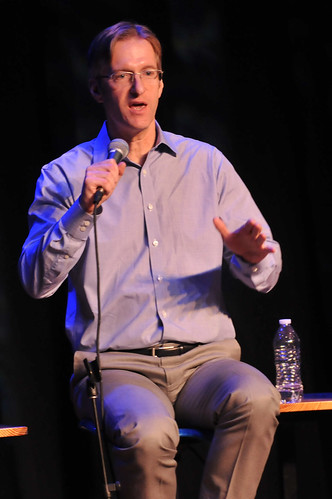
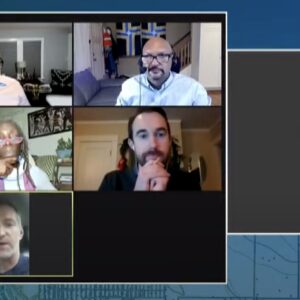
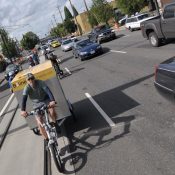
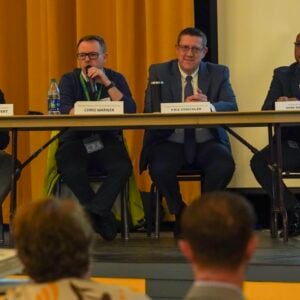
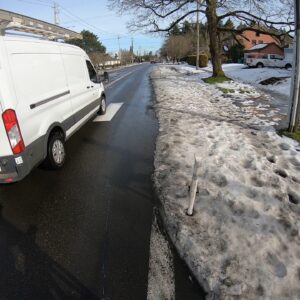
You can tell he (still) doesn’t know East Portland at all well when he mixes up 144th (a minor residential street) with 148th (a super-wide arterial). Not that the other candidates are any better.
I’m always suspicious of any City candidate that tries to use a non-city agency that they have no control over (TriMet in this case, but ODOT is common too) to attempt to move an agenda forward. Clearly they still have a long way to go towards understanding how the Portland transportation system works, how PBOT works, and the severe limits of its powers over the other agencies.
To be fair, the only way to move an agenda forward on the Powell-Division BRT project is to work with TriMet, ODOT and Metro. It’s not a misunderstanding of powers to say one wants a PBOT that leads assertively on certain issues.
Very true. I can’t think of an organization more in need of active assertive political leadership than PBOT, except maybe Metro. This “Vision Zero” thing has been a dud, as was the “Safe Sound and Green” effort before it. Long gone are the days of yore, when PBOT (PDOT as it was then) was a national leader in progressive transportation planning and implementation. Although it still plans, it implements so little that a small city like Gresham or an anonymous organization like PDXTransformation actually seem to do a lot more in comparison, with a lot less money.
This is what worries me. I’m not quite sure how making things more expensive can be done “equitably”. If it stays affordable for some or all, via a sliding scale or exemptions, then there is not much disincentive. If it gets too expensive only for some, then it really isn’t all that “equitable”, is it?
When the disincentive to drive is that “it’s too expensive”, then we magnify the class system already in place on the roads where only the truly rich are drivers, and everyone else is double-lower class—by transpo mode and by income. When those with the dangerous machines feel entitled (I paid good money for the “right” to drive around) and superior (I obviously make more money than you, and I could crush you like an insect with my mighty SUV) watch what happens. Stanford prison experiment anyone?
I wish there were some way to make driving less attractive via upping the convenience level of other modes, rather than the price of driving. If there were convenient enough alternatives, and driving was just an all-out hassle, then only those who truly felt they had to drive still would—but someone with less income who really needed to drive wouldn’t be priced out of it.
In an ideal world, we would heavily tax driving and use the funds to expand the public transport network, improve headways, and build out active transport.
… and maybe shift the capital improvement construction money away from PBOT (& ODOT) to an independent nonprofit, something like PDX Transformation, to implement any new improvements at much lower costs? Maybe use Ride Connection for local transit services, instead of TriMet?
At this point, though, it’s kind of a chicken/egg situation where we need funds to put driving in its proper place alongside vastly expanded active/public transport, but until active/public transport is vastly improved, driving is the best option for many lower-income folks who could least afford higher taxes. We can’t “take away” driving (via cost barriers) without a viable replacement. Want to ask “rich” drivers to pay more so they can get the “poor” drivers off the road?